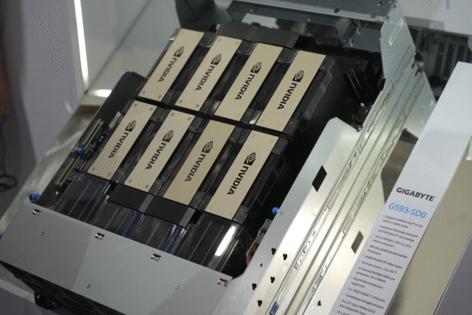US accuses four of smuggling advanced Nvidia chips to China
Published in Business News
Federal prosecutors charged two Chinese nationals and two U.S. citizens with a scheme to ship millions of dollars worth of sophisticated chips made by Nvidia Corp. to China in violation of national security export restrictions.
The men used a fake real estate business in Tampa, Florida, as a front to move the shipments of hundreds of chips through Malaysia and ultimately to China without applying for export licenses from the U.S. Commerce Department, according to an indictment unsealed Wednesday.
U.S. laws curtailing China’s access to advanced semiconductors began in earnest three years ago, and have been kept in place over concern that AI chips will strengthen China’s military and threaten U.S. national security. China’s rapid advances, including the launch of the DeepSeek AI chatbot in January, have heightened U.S. fears that its top economic rival is finding ways to evade restrictions and access sensitive American technology.
Questions of diversion extend to the most powerful spheres of the chip industry, including Nvidia Chief Executive Officer Jensen Huang, who spoke about the issue Wednesday on Bloomberg TV, following an earnings call for the world’s most valuable company. Huang sought to reassure his audience that the company has rigorous standards and inspection processes.
“The export system is rigorous and comprehensive,” an Nvidia spokesperson said in a statement after the four men were charged. “Even small sales of older generation products on the secondary market are subject to strict scrutiny and review.”
It’s not the first time the U.S. has made arrests for alleged smuggling of Nvidia chips to China. Two Chinese nationals were charged in August with using a company based in El Monte, California, to export advanced Nvidia AI chips without obtaining the necessary government licenses.
The U.S. said the Florida scheme, which ran from September 2023 until this month, used a company called Janford Realtor LLC as an “intermediary” for unlawful and unlicensed exports to China of advanced and highly controlled U.S.-origin graphics processing units. Prosecutors said Janford was never involved in any real estate transactions.
Three of the men identified GPU buyers inside China who placed orders through Janford and the fourth — an American businessman — procured chips for the scheme from his U.S. company, according to the indictment.
The Nvidia chips said to be illegally exported are A100s, data center chips that are behind the latest generations but can still train and run artificial intelligence models. The men are also accused of attempting to smuggle H100s, H200s and 10 supercomputers made by HP Inc. and powered by Nvidia chips. The Commerce Department has barred all the chips involved from export to China.
Prosecutors said the conspiracy encompassed four separate exports of Nvidia GPUs to China. The first and second exports resulted in 400 Nvidia A100 GPUs being exported to China between October 2024 and January 2025, but the third and fourth exports to China weren’t completed because they were disrupted by law enforcement, Tampa U.S. Attorney Gregory Kehoe’s office said in a statement.
Representative John Moolenaar, the Republican head of the House Select Committee on China, said in a statement the episode is just the “latest example” of Chinese attempts to flout U.S. export controls. He said the case highlights the need to pass legislation that would require location verification to ensure powerful U.S. chips don’t end up in the hands of restricted users.
The four charged in the indictment are Hon Ning Ho, Cham Li, Jin Chen and Brian Raymond.
Ho and Chen were arrested Wednesday and both were taken in custody while Raymond was released on bond, said a spokeswoman for Kehoe. Li made his first appearance Thursday in California and is in custody pending a detention hearing next week, she said.
Samuel Williams, a lawyer for Ho, declined to comment. Lawyers for the other men couldn’t immediately be reached for comment.
The indictment alleges that the defendants employed “various techniques to protect their anonymity and to thwart the detection of their activities” by the U.S. government and other law enforcement agencies.
If convicted of the most serious charges, the defendants face up to 20 years in prison.
The case is U.S. v. Ho, 25-cr-00530, U.S. District Court, Middle District of Florida (Tampa).
©2025 Bloomberg L.P. Visit bloomberg.com. Distributed by Tribune Content Agency, LLC.












Comments